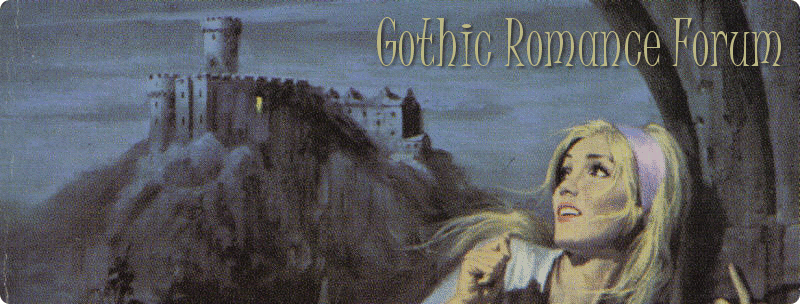09-15-2010, 02:18 PM
Luckily, the exchanges on this forum continue, and new members appear every day. So in that sense I'll enlarge on your toast to include the present and future, since in this case their connection is easy to see.
If you don't mind me running off on a tangent, though, I'd say that the past in general, or preoccupation with it, is a theme impossible to avoid in any discussion of Gothic literature.
Obviously, a strong sense of the past is common to most readers of Gothic Romance. I'd say it's practically a requirement for appreciation of the genre. Without wanting to morbidly over-analyze it, I'd say that it boils down to a nostalgic longing for an idealized past (because whether the real past would in fact be preferable is questionable, and probably irrelevant). It's easy to romanticize the past, although that doesn't mean that certain aspects of life in the past would not have better suited certain temperaments whose misfortune it has been to be born too late. The fun of a genre like Gothic Romance is that it is, of course, romantic; it mists over the harsher realities of the period to offer up a more appealing picture. Some of us might prefer to live in the 1840s -- so long as we were members of the upper class and never got a toothache. Or tuberculosis.
It's precisely this fictionalized, idealized past that I find tempting about the genre (and other historical fiction genres). When I say "idealized" I don't mean that only good things happened. Obviously it wouldn't be Gothic without evil in the world. But that evil, too, is idealized, given grandeur when embodied in the Gothic villain or anti-hero. The Gothic villain's motives are never petty or base, even if they are self-serving; their grandeur is that of theatric tragedy. The true Gothic antagonist always destroys himself.
Even the recent past seems safer and more pleasant in the Gothics written in the 1950s, '60s and '70s. The stories ostensibly take place in time periods during which many of us readers were alive, and yet . . . the world they inhabit seems impossibly far-off, a stage facsimile, an alternate universe in which everything is simpler and more picturesque. Sometimes I put the book down and think, "I remember when the world felt like this . . . or did it?"
If you don't mind me running off on a tangent, though, I'd say that the past in general, or preoccupation with it, is a theme impossible to avoid in any discussion of Gothic literature.
Obviously, a strong sense of the past is common to most readers of Gothic Romance. I'd say it's practically a requirement for appreciation of the genre. Without wanting to morbidly over-analyze it, I'd say that it boils down to a nostalgic longing for an idealized past (because whether the real past would in fact be preferable is questionable, and probably irrelevant). It's easy to romanticize the past, although that doesn't mean that certain aspects of life in the past would not have better suited certain temperaments whose misfortune it has been to be born too late. The fun of a genre like Gothic Romance is that it is, of course, romantic; it mists over the harsher realities of the period to offer up a more appealing picture. Some of us might prefer to live in the 1840s -- so long as we were members of the upper class and never got a toothache. Or tuberculosis.
It's precisely this fictionalized, idealized past that I find tempting about the genre (and other historical fiction genres). When I say "idealized" I don't mean that only good things happened. Obviously it wouldn't be Gothic without evil in the world. But that evil, too, is idealized, given grandeur when embodied in the Gothic villain or anti-hero. The Gothic villain's motives are never petty or base, even if they are self-serving; their grandeur is that of theatric tragedy. The true Gothic antagonist always destroys himself.
Even the recent past seems safer and more pleasant in the Gothics written in the 1950s, '60s and '70s. The stories ostensibly take place in time periods during which many of us readers were alive, and yet . . . the world they inhabit seems impossibly far-off, a stage facsimile, an alternate universe in which everything is simpler and more picturesque. Sometimes I put the book down and think, "I remember when the world felt like this . . . or did it?"




